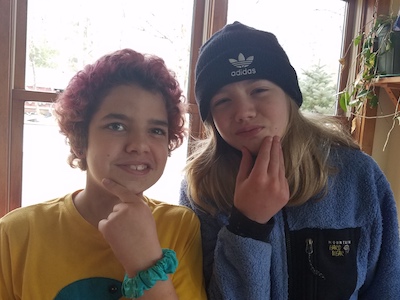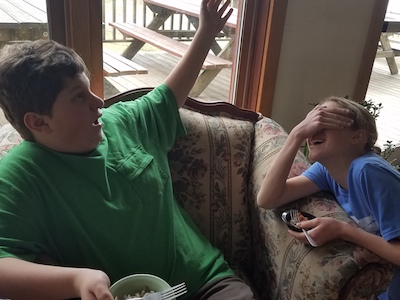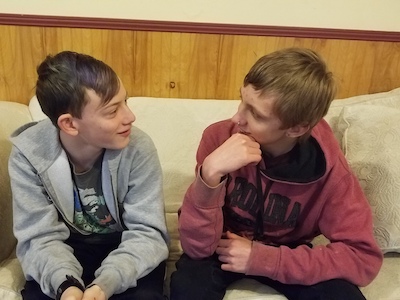Teaching Students to Ask Questions Instead of Answering Them

Middle school sometimes gets a bad rap. Dealing with young adolescents’ unpredictable emotions and behaviors is hard. It makes us forget that middle school is also a lot of fun. Learning evolves into something bigger during this age. Instead of just memorizing multiplication tables or vocabulary terms, middle schoolers also want to ponder larger concepts. They want to understand the world and their place in it. This is an important cognitive milestone. As educators, we should encourage this growth. We want them to think for themselves and form independent opinions about the world. We want them to ask questions–big questions.
During Arthur Morgan School’s Philosophy 18 Day Field Trip and the preceding class, students will do just that. They will ask themselves and each other some pretty big questions. They will think about life and the choices they make. Through the course and trip, AMS teachers hope students will gain a deeper appreciation for how they make decisions and what factors are influencing them. They hope to help them be more conscious about their actions as they witness firsthand the different ways people choose to live. In today’s post, teacher Rebecca Zeldin describes how she is teaching students to ask questions instead of answering them.
Why Teaching Middle Schoolers Philosophy is Important
 The late philosopher, Matthew Lipman developed a pedagogy of teaching philosophy to children. He wrote that students should learn to “think for themselves about things that matter.” In the opening session of our Philosophy class, students discussed just how challenging this seemingly straightforward proposition is. So many obstacles stand in the way of doing one’s own thinking. Students identified teachers, parents, religious leaders, influential friends, advertisements, and pop culture as all potentially impeding their freedom thought.
The late philosopher, Matthew Lipman developed a pedagogy of teaching philosophy to children. He wrote that students should learn to “think for themselves about things that matter.” In the opening session of our Philosophy class, students discussed just how challenging this seemingly straightforward proposition is. So many obstacles stand in the way of doing one’s own thinking. Students identified teachers, parents, religious leaders, influential friends, advertisements, and pop culture as all potentially impeding their freedom thought.
How does one liberate one’s thinking from the undue weight of these influences? It’s hard; no question about that. The aim of the Philosophy course is to overcome those obstacles. We want to help students to pose their own big questions and as a group, to rigorously pursue their own answers.
Teaching Students to Ask Questions
The approach that we take (following Lipman) is to begin by introducing students to a variety of stimuli. We will use short philosophical texts, exercises, film clips, and worksheets to inspire them to ask big philosophical questions. So far this year, students have posed questions that belong to various categories of philosophical inquiry including epistemology, aesthetics, metaphysics, and ethics. What is a dream and how does it relate to reality? What is happiness and is the purpose of life to be happy? Is it possible/desirable to lie to oneself? How do we decide what to believe? What makes something beautiful? And can we know anything for certain?
In class, once students decide on a question, they discuss that question thoroughly. They do so until they arrive at one or more workable hypotheses. The role of the teacher in these discussions is to teach our students to ask questions. We want them to think critically and creatively in their pursuit of satisfying answers. Acting as facilitators, we prompt students to give reasons, provide evidence, offer examples. They can then uncover their assumptions and tease out the implications of their views.
 We also work to develop a healthy culture of communication in the classroom. Supporting students to disagree respectfully and to learn to listen carefully to each others’ perspectives in an important goal. Philosophy class is hard. It demands that students spend class time, not listening to a teacher present material, but carefully and painstakingly honing their own thinking.
We also work to develop a healthy culture of communication in the classroom. Supporting students to disagree respectfully and to learn to listen carefully to each others’ perspectives in an important goal. Philosophy class is hard. It demands that students spend class time, not listening to a teacher present material, but carefully and painstakingly honing their own thinking.
Asking the Big Questions in the Big World
Taking philosophy on the road during our 18-Day Trip is an exciting prospect. Rather than small-scale stimuli, our middle schoolers will have be exposed a variety of immersive experiences. We hope these moments will elicit their philosophical questions and ask more big questions. After a few days in the Asheville area, we’ll head south to Florida. (Philosophy can be done anywhere, so why not do it where it’s warm?) There will we visit old AMS friends like Al Geiger and also the Winsburgs at Green Cay Wetlands. Along the way we’ll visit intentional communities, religious centers, urban and suburban areas, and a variety of wilderness sites.
We’ll learn about how people live, what they value, and how they spend their time. In response, we’ll pose big questions that help us decide how we might want to live, what we might value, and how we might spend our time. When we return, we expect to be a little bit tanner, a touch more worldly, and hopefully quite a bit wiser for our efforts.
-by Rebecca Zeldin
